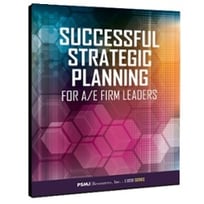-3.jpg?width=300&height=168&name=images%20(2)-3.jpg)
Our strategic planning engagements address directly the core issues of firm growth. And here many professionals will argue for controlling or moderating that growth ("let's not grow just for growth's sake").
But there is a problem with this idea: To actually slow down growth, one needs to say NO to clients and projects. And most Architectural/Engineering professionals simply aren't any good at this. Passion for the new challenge, desire to keep the team busy, fear of losing the client forever—there are many reasons why it's usually hard to say no.
But sometimes this growth challenge is more than just a question of business strategy—it might also be a question of business ethics. Exploring this further, here are four questions to ask:
Can we do this work well? Creative professionals like new challenges, and working on stuff they've never done. And sometimes you do have to "fake it until you make it," stretching and growing the organization and its competencies. Still, there is a line that can be crossed, when the team is way out beyond its capabilities, and the client is paying extra (perhaps a lot) for them to figure it out. If the customer doesn't understand this reality, that's a problem. So yes, indeed, stretch the team, but don't fake it beyond the reasonable - and make sure the client fully understands what's going on.
Can we meet the schedule? It's all too common in industry for professionals to over-promise and under-deliver the schedule. We say we can finish the project in eight weeks, even though we know it'll take twelve. Then we flay around, shifting resources, jiggering the board, working outrageous hours—and sometimes still disappointing the client. This is a lousy business practice, and it's low on ethics as well. Wise professionals know what it'll take, and they tell it like it is. Meeting the schedule is a part of the product solution - in fact it's one of the most tangible, visible ways the client sees your work.
Can we meet the budget? Of course it's common to push the envelope here as well, shaving down the fee to win the work (and then hoping for the best). How many times have you said if everything goes well? (Everything never goes well). This too is poor business practice, and it's unethical if we know definitively that the budget is too low, the client isn't aware of it, and we're not talking about it. Some of your competitors may think this pathway is necessary—or even OK. How about you? (Keep in mind that few of us will look back years later and wish we'd been less ethical).
Is this good for the firm? Architects, engineers, scientists, planners—professionals are usually good at addressing the question "Can we do this?" (This is about experience, capabilities, resources, and passion). These same professionals are much less proficient at addressing the question "Should we do this?"—which is about priorities, opportunity costs, and business strategy. And although we don't think of it enough, these choices may also involve a consideration of ethics. Owner-leaders have a responsibility not only to provide good service to customers, they also must strive to maintain a sustainable place of employment for staff, and an attractive business return for shareholders. Taking on a project just because it's big, or cool, or good for some (but not all) may very well be the wrong path for the firm to take.
Often we look at ethics as a black and white subject—stuff that's seedy, obviously against normal practice, and possibly even illegal—you know, what the bad guys do (As long as we're not doing bad things, we feel pretty good.). But day-to-day business is often gray, and many everyday decisions—like whether or not we should take on a new project—might involve more downside than we think. That's a question worth considering.
 Looking for more tips, check out Successful Strategic Planning For A/E Firm Leaders. In this free e-book, you’ll find specific suggestions to help your architecture or engineering think of “planning” as something you do all the time, tending to it at regular intervals—as a process that never ends and an ongoing part of running a successful business.
Looking for more tips, check out Successful Strategic Planning For A/E Firm Leaders. In this free e-book, you’ll find specific suggestions to help your architecture or engineering think of “planning” as something you do all the time, tending to it at regular intervals—as a process that never ends and an ongoing part of running a successful business.
Other strategic planning related blog posts:
8 Tips For Making Your Strategic Planning Meeting A Success



